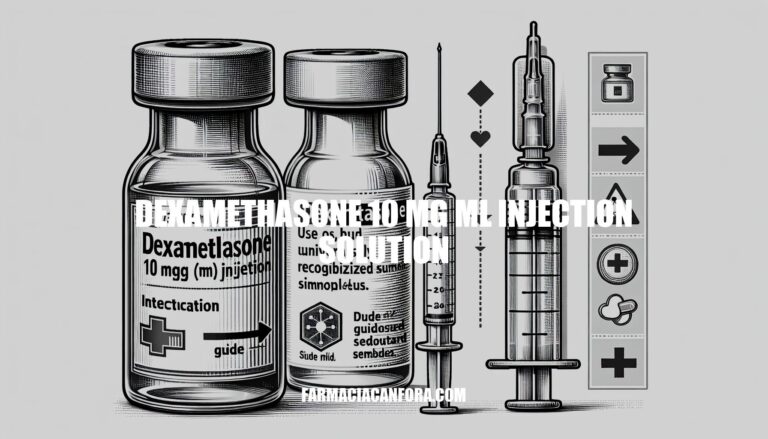


Dexamethasone 10 mg/ml injection solution is a corticosteroid used to reduce inflammation and suppress the immune system. It’s commonly prescribed for conditions like arthritis, severe allergies, asthma, and certain types of cancer. This medication is significant in medical treatments due to its ability to quickly alleviate symptoms in severe conditions where oral medications are not effective.
Dexamethasone 10 mg/mL Injection Solution:
Active Ingredient:
Excipients:
Dexamethasone, a corticosteroid, works at the cellular level by binding to glucocorticoid receptors in the cytoplasm. This complex then translocates to the nucleus, where it modulates gene expression. Here’s how it affects inflammation and immune response:
Inflammation: Dexamethasone suppresses the migration of neutrophils and reduces the production of inflammatory mediators like prostaglandins and leukotrienes. It also decreases capillary permeability, which helps reduce swelling.
Immune Response: It inhibits the activity of various immune cells, including T cells and macrophages, and reduces the production of cytokines, which are crucial for immune signaling. This leads to a decreased immune response.
This dual action makes dexamethasone effective in treating conditions involving excessive inflammation and overactive immune responses.
Here are the medical conditions and scenarios where dexamethasone 10 mg/ml injection solution is commonly prescribed, along with its therapeutic benefits:
Dexamethasone 10 mg/ml Injection Solution:
Dosage and Administration:
Special Instructions:
Important Notes:
Always follow your healthcare provider’s instructions for the best outcomes.
Potential Side Effects:
Serious Side Effects:
Necessary Precautions:
Contraindications:
If you have any specific concerns or symptoms, it’s best to consult your healthcare provider.
Dexamethasone 10 mg/ml injection solution is a corticosteroid used to reduce inflammation and suppress the immune system. It’s commonly prescribed for conditions like arthritis, severe allergies, asthma, and certain types of cancer.
The medication works by binding to glucocorticoid receptors in the cytoplasm, modulating gene expression, and suppressing the migration of neutrophils and reducing inflammatory mediators.
The solution is effective in treating conditions involving excessive inflammation and overactive immune responses. It’s commonly prescribed for severe allergic reactions, arthritis, asthma, cancer, blood/hormone disorders, skin diseases, eye problems, breathing problems, bowel disorders, edema, multiple sclerosis, lupus, and diagnostic testing.
Dosage and administration vary depending on the condition, with initial doses ranging from 0.5 mg/day to 9 mg/day. The solution can be administered intravenously (IV), intramuscularly (IM), intra-articularly, or intralesionally.
Adults should have their dosage tailored to their response and condition, while children require careful adjustment based on severity and response.
Elderly patients may require lower doses due to increased risk of side effects, and pregnant/breastfeeding women should use the medication only if clearly needed and prescribed by a doctor.
Regular monitoring for side effects and effectiveness is essential, with gradual reduction in dosage to prevent withdrawal symptoms.
Potential side effects include fluid retention, headache, dizziness, increased blood pressure, slow wound healing, acne, thinning skin, bruising or discoloration, changes in menstrual periods, body fat distribution, stomach upset, heartburn, trouble sleeping, and pain/redness/swelling at the injection site.
Serious side effects may include allergic reactions, fever, chills, tiredness, muscle weakness, blurred vision, bloody or tarry stools, seizures, increased pressure inside the skull, pancreatitis, and low blood potassium.
Necessary precautions include informing your doctor of all medical conditions and medications, regular monitoring for side effects, gradual dose reduction to minimize withdrawal symptoms, and avoiding sudden discontinuation.
Contraindications include allergy to dexamethasone and fungal infections.